Saleena Karim's Blog, page 7
July 27, 2012
Been a while … New Visionary Fiction site
This is just a quick post to say that though I’ve not posted for a while (and didn’t anticipate being so slow), I’m still around and hope to start blogging regularly again soon. The reasons for my absence are to do with personal and work distractions, but I have lots of news to share, so watch this space.
In the meantime, anyone coming through from today may notice a new banner in the right-hand column of this page, headed: ‘VFA Founding Member’. It stands for ‘Visionary Fiction Alliance’ (sounds grand, doesn’t it?). The web-ring that Jodine Turner, Shannan Sinclair and I started just a couple of months ago has already attracted 12 authors and we are about to launch a whole site dedicated to the promotion of visionary fiction. More to come later.
April 24, 2012
Literature and Art as Collective Dreams
Iqbal believed that art and literature are like collective dreams, which come true. Therefore they should present the world as it should be, and not as it appears to be.
This line is taken (with permission) from Khurram Shafique’s upcoming work examining ‘peaks’ in the timeline of Pakistan. He has divided its history into seven phases, each lasting approximately twenty years each, starting from way back in 1887. Pakistan of course formally came into existence in 1947 but Mr Shafique is looking at the development of this ‘nation’ from its conception, of sorts (or at least, that’s how I understood it, and hope I am correct). In fact this work is a completely new discovery looking at what he calls the ‘stages of collective self-development’.
Anyway, I just wanted to quote that line because it spoke to me as a writer. For anyone who wants to know more, Mr Shafique’s formal publication will be printed soon – and will possibly be also available in ebook form. In the meantime, he has been talking about (for quite a while now) over at the Republic of Rumi website. See this blog post for more.
April 21, 2012
On Murtaza Razvi’s death
I am totally shocked this morning to hear about the murder of head of Dawn’s magazines Murtaza Razvi on Thursday (19 April 2012). Very sad news indeed, and my thoughts go out to his family and friends.
April 13, 2012
To Be or Not to Be Didactic
The Marghdeen Learning Centre’s latest course on Iqbal is exploring the philosopher’s take on art (with a focus on literature). Though he was born in the period when l’art pour l’art was developing as a new movement, Iqbal didn’t believe in art for art’s sake. In fact, he took a dim view of it. In one of his articles published in July 1917, he wrote:
“[Art for art's sake] appeals more to imagination than to will, and on the whole acts as a narcotic on the mind of the reader. … the good in art is not necessarily identical with the good in life; it is possible for a poet to write fine poetry, and yet lead his society to Hell. The poet is essentially a seducer; woe to his people, if instead of making the trials of life look beautiful and attractive he embellishes decadence with all the glories of health and power, and seduces his people to extinction.”
(I should add that in this article Iqbal was talking specifically about poets but his views applied to art in general.)
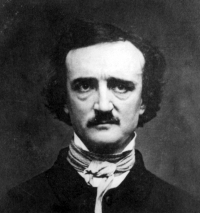
19th century author Edgar Allan Poe famously called didactic poetry 'heresy', but he was also an early pioneer of modern sci-fi
The late sci-fi author and academic Joanna Russ suggested in 1975 that all science fiction is didactic in the vein of medieval fiction. The word ‘didactic’ itself originally meant art with educational or informative content. It was only from the 19th century onwards that it was redefined to mean something ‘burdened’ with this content. It seems that this negative definition of didactic fiction coincides with the onset of modern materialism (as the outcome of the Enlightenment period).
I wonder what Iqbal would have made of visionary fiction. Part of its appeal – for me, at least – is that it isn’t art for the sake of art. And yet funnily enough, over at the Visionary Fiction Goodreads group we all recently agreed that visionary fiction isn’t overtly ‘preachy’. Is this a contradiction? Not really. We can liken it to how non-fiction deals with facts. Whilst non-fiction writers present their facts as they see them and obviously have an opinion of their own, they don’t necessarily claim to having the final word on a subject – at least, not if they’re honest.
Visionary fiction is didactic in the former sense, rather than the latter. In fact, I’ve always felt that all fiction has something to teach us, whether or not that is the author’s conscious intent. It all has a value. The real question is whether that value is ‘good’ or ‘bad’, that is, constructive or destructive. Iqbal believed the most destructive form of art is pessimistic, nihilistic, and amoral, even if it uses beautiful imagery. It glorifies death. True constructive art, in Iqbal’s view, is optimistic, life-affirming, and encourages us to face life’s challenges – large and small – with courage and dignity.
“The highest art is that which awakens our dormant will-force, and nerves us to face the trials of life manfully.”
In other words, Iqbal believed that art doesn’t just reflect human psychology (collective and individual). It can actually have a hand in shaping our destinies. A huge claim, but it resonates with those who value the power of ‘story’.
March 28, 2012
Scorpion and the Peace Man: Interview at Mother/Gamer/Writer
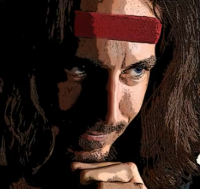 Today I'm being interviewed at the popular reviews site Mother/Gamer/Writer. As well as explaining exactly Peter Manner (aka the Peace Man) from Systems has in common with Scorpion from the video game series Mortal Kombat, I have also mentioned my search for any metal music bands to help me with recording a song that appears in the novel …
Today I'm being interviewed at the popular reviews site Mother/Gamer/Writer. As well as explaining exactly Peter Manner (aka the Peace Man) from Systems has in common with Scorpion from the video game series Mortal Kombat, I have also mentioned my search for any metal music bands to help me with recording a song that appears in the novel …
Do head on over there and say hello (you'll have to scroll down their page!) – if you do, you'll be in with a chance of winning a signed paperback copy of Systems or an ebook in any format you like.
Systems in an Iqbal Education Programme
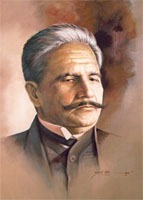
Courtesy allamaiqbal.com
Yesterday I learned that the Systems trailer has been included in a course (Title: DNA of History: History According to Iqbal) being run by the Marghdeen Learning Centre, a body affiliated with the Iqbal Academy. I felt truly honoured at the mention, especially because of the particular focus of the lesson in which the trailer appeared. (I would have linked to the lesson page, since the course is run online, but you can't view it unless you're a participant on the course).
THE AGE OF POTENTIAL
Here are some of the most interesting points made in the lesson by the course teacher, Khurram Ali Shafique:
"Do we find any common strand" in the events of our times? Yes. Everything happening in our times is related to "Potential."
In the field of natural sciences, we have already moved on from principles to potentials: the "principles" of natural sciences discovered in the previous phase gave birth to an age of invention in our times.
The problem is that while we discovered the tremendous potential of the physical world, we have not matched it with similar progress in discovering the potential of the human soul …
… Let's begin with the most basic thing: Tawhid , or the Unity of God. According to Iqbal, the three principles implied in the Unity of God are "equality, solidarity, and freedom." …
… Let me summarize. What I have tried to share is that we are now living in the age of potential. The three traits of this age are:
Nations cannot be forced into slavery anymore, although they can still be deceived into it – and this is regardless of how weak the victim or how strong the oppressor. This is the potential of freedom.
The world is rearranging itself into nation states, which are likely to develop symbiotic relationship. This is the potential of solidarity.
Nations can become aware of their destinies and make informed choices based on this awareness. This is the potential of equality.
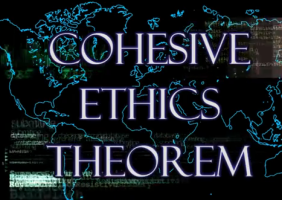
Snapshot from Systems trailer
LITERALLY TRUE
So once again, the focus is on the three ideals that appear in the Cohesive Ethics Theorem. Most interestingly of all, Mr Shafique has stressed that Iqbal's own reference to these three principles in his famous Reconstruction lectures should be understood literally. In other words, the key to unlocking human potential in full can only come mastering our understanding of these specific three principles, just as we have begun to unlock the creative potential of the physical universe by mastering our understanding of the laws of nature. As someone says in Systems:
'Some would say that what I have suggested is utopian, and moreover impossible. This is not so. As I see it, humanity cannot realise its true potential until we accept that an ideal society is not only possible, but absolutely mandatory.'
The lesson opens with this question: Do you think that this video (Systems trailer) is relevant to what is being discussed in this post?
I reply: Why yes, and not in a small way!
But then, I would say that. 
And a final note: I highly recommend joining the courses at the Marghdeen Learning Centre. They are cleverly designed to be as informal as possible, while introducing some thought-provoking ideas.
March 25, 2012
An Ideal Advert … or Maybe Not
Earlier this week an article of mine appeared in the Pakistani newspaper Dawn's Special Report on the Lahore Resolution. For those of you who don't know, the Lahore Resolution might be described as (sort of) the Pakistani equivalent of the American Declaration of Independence, and Pakistanis celebrate this document (and argue about its significance) every year on 23rd March.
While I was browsing the e-paper at Dawn's website, this advert caught my eye:
It was a reproduction of the major signatories of the Lahore Resolution, accompanied with the header: 'Equality, Freedom, Unity'. Of course this was immediately interesting to me because of the three words that also happen to be central to the Cohesive Ethics Theorem in Systems. And, if you can read it from the above scan, there was an inspiring passage about how the Lahore Resolution was passed in the name of said principles, and how they must be protected today.
I saw the url: efulife.com, and went over. I expected to find a human rights organisation or activist group. Instead, I found … a life insurance company! But here's the real punchline: The company was originally founded in the 1930s under the name 'Eastern Federal Union', by none other than Ghulam Mohammad, who would later become the Governor-General of Pakistan. Anyone who has read SJ2 will know exactly why this is all more than a little ironic. For anyone who hasn't, I have three more words for you:
Pakistan's first dictator.
March 20, 2012
The Place of Visionary Fiction in Today’s World – Introduction

Last week I introduced the Visionary Fiction web-ring. This week, our three founding members – Jodine Turner, Shannan Sinclair and myself – are guest posting at each other’s blogs about the place of Visionary Fiction in Today’s World.
You can find my entry at Jodine’s blog here, and Jodine’s entry at Shannan’s blog here. Shannan’s entry will appear at this blog soon.
The Place of Visionary Fiction in Today's World – Introduction

Last week I introduced the Visionary Fiction web-ring. This week, our three founding members – Jodine Turner, Shannan Sinclair and myself – are guest posting at each other's blogs about the place of Visionary Fiction in Today's World.
You can find my entry at Jodine's blog here, and Jodine's entry at Shannan's blog here. Shannan's entry will appear at this blog soon.
March 12, 2012
Introducing the Visionary Fiction Ring
 Recently I wrote a post about the difficulty I was having with defining the genre of Systems. Though I found the elusive 'metaphysics' category at Amazon (and no, I haven't got round to re-classifying Systems there yet), I still felt that it would be good if the novel could be classified in a way that didn't make it sound like it belonged to a tiny or specialist niche (or conversely placed it in too broad a category such as sci-fi).
Recently I wrote a post about the difficulty I was having with defining the genre of Systems. Though I found the elusive 'metaphysics' category at Amazon (and no, I haven't got round to re-classifying Systems there yet), I still felt that it would be good if the novel could be classified in a way that didn't make it sound like it belonged to a tiny or specialist niche (or conversely placed it in too broad a category such as sci-fi).
Since then I've met Jodine Turner and Shannan Sinclair at a Goodreads group dedicated to visionary fiction. We've all agreed that since our type of fiction needs a brand awareness campaign, we're going to make an attempt to do just that ourselves. And so, we've started a web-ring for visionary fiction (see the new menu on the right-hand side of this page containing links to Jodine and Shannon's sites) and we're brainstorming some other ideas at the moment. I've also created a new category at this blog especially for Visionary fiction.
So, what is visionary fiction? In one way it could be described as similar to inspirational fiction; it's often inspired by a search for a higher truth, but it isn't always about or aimed at readers of a particular faith. It can be metaphysical, or esoteric, or spiritual in tone. It often involves the paranormal. Of course this means that visionary fiction is most likely to also fall under fantasy, as does Jodine's Carry on the Flame series. But this is not always the case. Systems (as sci-fi) is a case in point. So is Shannan's Dream Walker, which she describes as 'Quantum fiction' because it is based on string theory.
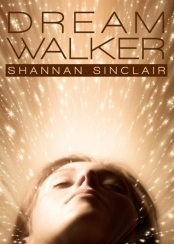 But what all visionary fiction has in common is that it it takes its inspiration from that fascinating creature called humanity and explores its limitless potential. A pioneer of the term 'visionary', Michael Gurian, describes it as "fiction in which the expansion of the human mind drives the plot".
But what all visionary fiction has in common is that it it takes its inspiration from that fascinating creature called humanity and explores its limitless potential. A pioneer of the term 'visionary', Michael Gurian, describes it as "fiction in which the expansion of the human mind drives the plot".
Interested in knowing more? Watch this space for updates. Soon Jodine and Shannan will be dropping in to give us their insights on visionary fiction and its relevance in today's world.
If you have written a novel and think it might fit into what I've described here, say hello here or at Goodreads. We're looking for more authors to join this ring.




